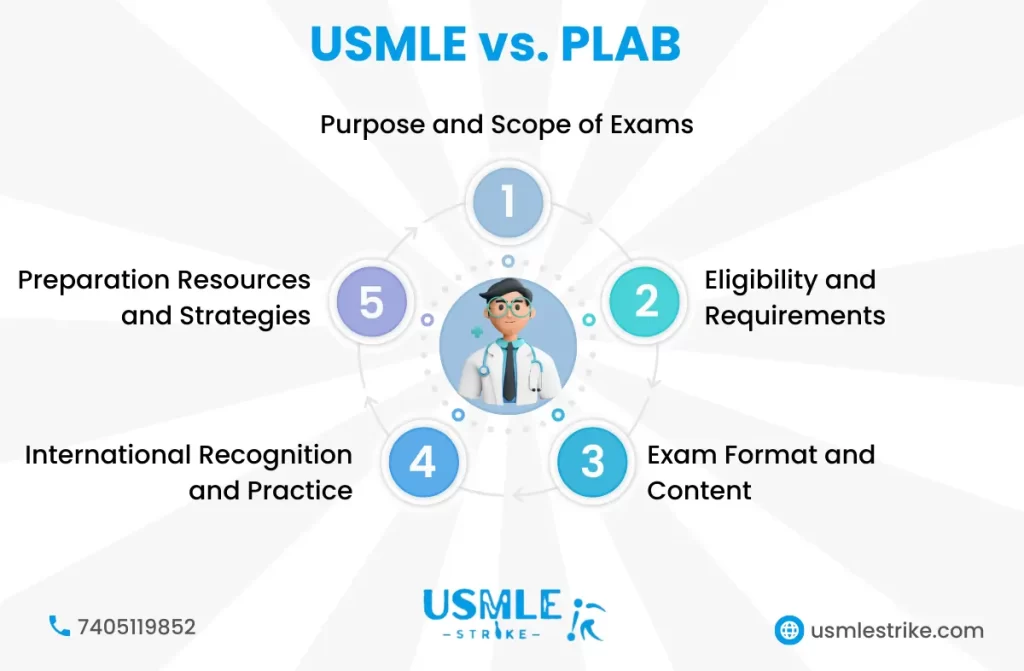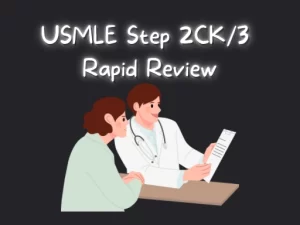USMLE vs. PLAB
Starting your medical career in the US or UK is a rewarding journey, but for international medical graduates, it often involves navigating through the intricacies of medical licensing exams first after MBBS to enter into the healthcare sector of these two countries.
Therefore, these two popular choices are the United States Medical Licensing Examination (USMLE) and the Professional and Linguistic Assessments Board (PLAB) exam in the United Kingdom.
These two exams, USMLE vs. PLAB, are NOT DEGREES but benchmarks for registering into the US and UK healthcare systems.
So if you have done your MBBS and are looking to pursue your medical profession in the US or UK, then this guide is for you as it aims to provide a comprehensive comparison of USMLE and PLAB, shedding light on their similarities, differences, and factors to consider when choosing the right medical licensing exam for your career aspirations.
Let’s dive into the core!
Exam Structure and Format – USMLE vs. PLAB
The USMLE is divided into three steps:
Step 1, Step 2 Clinical Knowledge (CK), and Step 3.
Step 1 and Step 2 CK are computer-based multiple-choice exams. Step 3 is a two-day computer-based exam focusing on clinical decision-making and patient management.
Here, USMLE Step 1 and Step 2 CK are computer-based multiple-choice exams. Step 3 is a two-day computer-based exam focusing on clinical decision-making and patient management.
Whereas the PLAB exam consists of two parts:
PLAB 1 and PLAB 2.
PLAB 1 is a multiple-choice exam assessing theoretical knowledge, while PLAB 2 evaluates clinical skills through practical assessments, including history-taking, examination, and communication skills with simulated patients.
| Aspect | USMLE | PLAB |
|---|---|---|
| Purpose | To practice USMLE medicine in the USA. | To practice medicine in the UK. |
| Eligibility | Medical graduates or students in/graduated from a medical school listed in the World Directory of Medical Schools. | Graduates from a medical school recognized by the UK General Medical Council. |
| Structure | Basic medical sciences, clinical knowledge, patient care. | Two parts: PLAB 1 (a written multiple-choice exam) and PLAB 2 (an OSCE, Objective Structured Clinical Examination). |
| Content Focus | Basic medical sciences, clinical knowledge, patient care, and communication skills. (OET has replaced Step 2 CS) | Clinical knowledge, skills, and communication appropriate for UK practice. |
| Format | Basic medical sciences, clinical knowledge, and patient care. | PLAB 1: computer-based. PLAB 2: practical clinical exam. |
| Exam Duration | Step 1: 1 day; Step 2 CK: 1 day; Step 3: 2 days. | PLAB 1: 3 hours; PLAB 2: half a day. |
| Scoring | Worldwide for Step 1 and Step 2 CK. Step 3 is only in the USA. | Pass/fail basis. |
| Cost | Varies for each Step. Step 1 and Step 2 CK each cost several hundred dollars. Step 3 costs more—additional costs for test centres outside the USA. | PLAB 1: around £239; PLAB 2: around £875. Prices may vary. |
| Location of Testing Centers | Limited attempts (usually 3-6 per Step, vary by state). | PLAB 1: Worldwide. PLAB 2: Only in the UK. |
| Validity of Passing Score | Generally valid for 7 years but can vary by state. | Valid for 2 years. |
| Attempts Limit | Limited attempts (usually 3-6 attempts per Step, varies by state). | ECFMG certification is required for international medical graduates (IMGs). |
| Application Process | Residency program in the USA varies by specialty and hospital. | Registration with the GMC required before taking the exam. |
| Post-exam Requirements | Residency program in the USA varies by speciality and hospital. | Foundation Year 1 post (FY1) in the UK for IMGs. |
Geographic Scope & Recognition – USMLE vs. PLAB
The USMLE is widely recognized in the United States and is a requirement for medical licensure in all 50 states. It is also accepted in several other countries, allowing physicians to pursue residency programs and practice medicine globally.
On the other hand, PLAB is specific to the United Kingdom, and successful completion of the exam is a prerequisite for full registration with the General Medical Council (GMC). It enables international medical graduates to apply for residency training programs and practice medicine within the UK healthcare system.

Difficulty Level and Preparation – USMLE vs. PLAB
Both USMLE and PLAB exams require rigorous preparation. The USMLE is known for its comprehensive medical knowledge and clinical skills coverage, making it a demanding and challenging exam. Extensive study materials, review books, and question banks are available to aid in exam preparation.
PLAB, while still challenging, focuses more on the application of knowledge in clinical scenarios. Several preparatory courses, online resources, and mock exams are available to familiarize candidates with the exam format and assess their readiness.
Career Opportunities – USMLE vs. PLAB
Choosing between USMLE and PLAB involves considering your career goals and desired geographical location. Passing the USMLE opens doors to a wide range of residency programs in the United States and provides opportunities to work in renowned healthcare institutions. The US medical system offers diverse specializations and research opportunities, attracting many international medical graduates.
For those interested in practising medicine in the UK, PLAB provides a pathway to obtain GMC registration and pursue residency training within the National Health Service (NHS). The UK healthcare system offers its own unique advantages, including exposure to a different healthcare model and the opportunity to work in a multicultural environment.
Time & Financial Considerations
The duration and cost of each exam are important factors to consider. The USMLE is a lengthier process, typically taking several years to complete all the steps. Each step has its registration fee, and additional expenses may include study materials and exam preparation courses.
PLAB, in comparison, has a shorter timeline, often completed within a year. The exam fees and associated costs, including preparatory resources, may vary but are generally lower than the USMLE.
USMLE Vs. PLAB: Which one to choose?
Deciding between the USMLE and the PLAB exam hinges on your career aspirations and the location where you intend to practice medicine. Opt for the USMLE if your goal is to practice medicine in the United States, as it is a mandatory examination for medical professionals seeking licensure in the U.S. The USMLE holds global recognition and may also be accepted by medical boards in various other countries.
Conversely, if your plan involves practicing medicine in the United Kingdom, then the PLAB exam is the route to pursue. The PLAB exam serves as the primary pathway to registration with the General Medical Council (GMC) in the UK and is also acknowledged by certain medical boards in other nations.
Recognize that both exams pose significant challenges, requiring substantial preparation and dedicated study. Conduct a thorough examination of the pros and cons of PLAB vs USMLE to make an informed decision. Take into account your career objectives, conduct detailed research, and carefully assess the requirements of the medical board in your desired country.
Ultimately, your choice should align with your desired practice location, the specific regulations of the relevant medical board, and your individual preferences.
Conclusion
Hence, the USMLE provides access to a wide range of opportunities in the United States, while PLAB offers a pathway to practice medicine in the UK. Therefore, when deciding, consider USMLE vs. PLAB, their exam structures, geographic recognitions, difficulty levels, career opportunities, and associated time and financial considerations. Also, seek guidance from mentors, advisors, and professionals familiar with both exams to make an informed choice that aligns with your medical aspirations and plans.
Read also: Boards and Beyond vs USMLE Strike: A Comparative Review for Medical Students.





